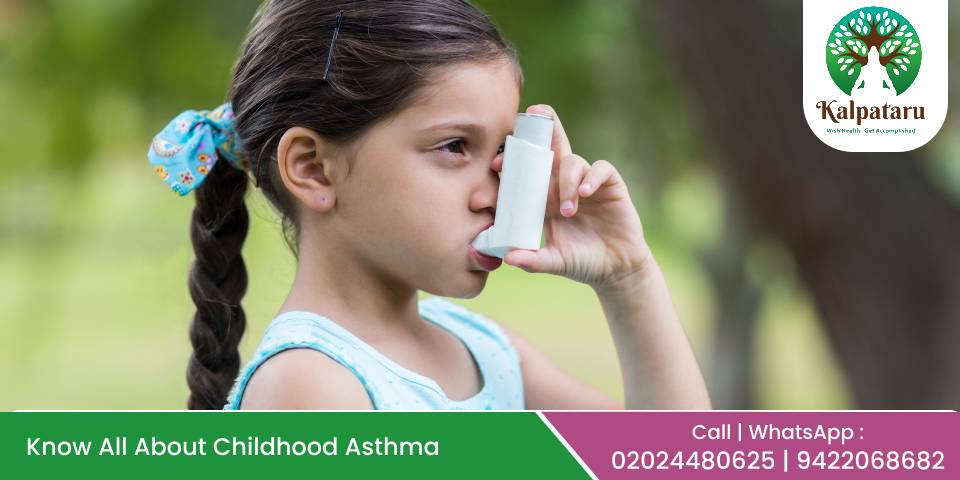What is Childhood Asthma?
Childhood asthma is a chronic respiratory condition characterized by inflammation and narrowing of the airways, leading to recurrent episodes of wheezing, coughing, shortness of breath, and chest tightness in children. It is one of the most common chronic diseases in childhood, affecting millions of children worldwide. It can cause significant distress and impact a child’s quality of life. However, this disorder can be treated and managed successfully with Ayurveda! Ayurveda, an ancient Indian system of medicine, offers a holistic and natural approach to managing childhood asthma. In this blog, we will explore the causes, symptoms, and diagnosis of childhood asthma, along with Ayurvedic treatment for Childhood Asthma that can help alleviate its effects.
What are the causes of Childhood Asthma?
The exact causes of childhood asthma are not fully understood. Here are some factors that are known to contribute to the development of childhood asthma:
- Genetic predisposition
- Allergens: Allergens such as dust mites, pollen, mold, pet dander, and certain foods can trigger asthma symptoms
- Environmental triggers
- Respiratory infections
- Premature birth
- Obesity
- Hygiene Hypothesis
- Sensitive immune system
- Weather changes & cold air
What are the symptoms of Childhood Asthma?
Identifying the symptoms of childhood asthma is crucial for early intervention and effective management. Some common symptoms include:
- Recurrent wheezing: A high-pitched whistling sound during breathing, especially during exhalation.
- Frequent coughing: Mostly at night or in response to physical activity, cold air, or exposure to triggers.
- Shortness of breath: Children may experience difficulty catching their breath or complain of chest tightness.
- Chest congestion: A sense of heaviness or pressure in the chest due to excess mucus production.
- Fatigue and reduced stamina: Asthma can cause fatigue and limit a child’s ability to participate in physical activities.
If your child exhibits any of these symptoms, it is important to consult an Ayurveda specialist in Pune for a proper evaluation and diagnosis.
How to Diagnosis of Childhood Asthma?
The diagnosis of childhood asthma involves a combination of medical history, physical examination, and lung function tests. Here are the steps typically involved in diagnosing childhood asthma:
- Medical History: Dr. Manoj Deshpande will ask questions about the child’s symptoms, including the frequency, duration, and triggers of coughing, wheezing, shortness of breath, and chest tightness. They will also inquire about any family history of asthma or allergies, as well as the child’s medical history, including past respiratory infections or hospitalizations.
- Physical Examination: The doctor may listen for wheezing sounds in the lungs and evaluate overall respiratory health.
- Lung Function Tests: Spirometry and peak flow meter tests assess lung function and measure the amount of air a child can exhale forcefully.
- Monitoring symptoms: Keeping a record of symptoms, their frequency, and triggers can assist in diagnosis and treatment planning.
- Other Tests: Additional tests may be ordered to rule out other conditions that can cause similar symptoms, such as chest X-rays, allergy testing, or blood tests.
How Kalpataru Ayurvediya Chikitsalaya™ Ayurvedic Doctors Treat Childhood Asthma?
Kalpataru Ayurvediya Chikitsalaya™ is a renowned Ayurvedic clinic in Pune, Maharashtra that specializes in providing holistic healthcare solutions, including the treatment of childhood asthma. The clinic follows traditional Ayurvedic principles and offers personalized treatment plans tailored to each child’s unique needs & the experienced Ayurvedic Dr. Manoj Deshpande follows a comprehensive approach to manage and alleviate the symptoms of asthma in children. Here’s an overview of how Ayurvedic doctors at Kalpataru Ayurvediya Chikitsalaya™ approach the treatment of childhood asthma:
- Comprehensive Consultation: The Ayurvedic doctors at Kalpataru Ayurvediya Chikitsalaya™ begin by conducting a detailed consultation to understand the child’s medical history, symptoms, and triggers. This helps them determine the underlying imbalances in the body and customize the treatment accordingly.
- Prakriti Assessment: Ayurveda believes that each person has a unique constitution or “Prakriti.” By determining the child’s prakriti, the Ayurvedic doctor can customize the treatment plan to address their specific needs.
- Herbal remedies: Ayurvedic doctors at Kalpataru Ayurvediya Chikitsalaya™ prescribe herbal medicines like Adhatoda vasica (Vasaka), Glycyrrhiza glabra (Yashtimadhu), and Curcuma longa (Turmeric), Ringani, behads that have anti-inflammatory, bronchodilator, and immune-modulating properties that can help reduce bronchial inflammation and improve breathing and boost the child’s immune system.
- Dietary and Lifestyle Modifications: Kalpataru Ayurvediya Chikitsalaya™ places great emphasis on the role of diet and lifestyle in managing asthma. Doctors provide often provide dietary and lifestyle recommendations to support the management of childhood asthma. This may include avoiding trigger foods, incorporating specific herbs and spices into the diet, practicing breathing exercises (pranayama), and maintaining a healthy lifestyle.
- Panchakarma Therapy: Panchakarma is a detoxification and rejuvenation therapy in Ayurveda. Depending on the child’s condition, the doctors may recommend specific Panchakarma procedures like Vamana (therapeutic vomiting), Virechana (therapeutic purgation), or Nasya (nasal administration of medicines) to eliminate toxins, improve respiratory health, and strengthen the respiratory system.
- Follow-up and Monitoring: After the initial treatment, regular follow-up sessions are scheduled to monitor the child’s progress and make any necessary adjustments to the treatment plan. The Ayurvedic doctors at Kalpataru Ayurvediya Chikitsalaya™ provide ongoing support and guidance to ensure the best possible outcome for the child’s asthma management.
Conclusion:
Childhood asthma can significantly impact a child’s quality of life, but with the right approach to treatment, it is possible to manage and alleviate symptoms effectively. Ayurveda offers a holistic approach that addresses the underlying causes of asthma, focusing on restoring balance and promoting overall well-being. Kalpataru Ayurvediya Chikitsalaya™ is a leading Ayurvedic clinic in Pune, India that specializes in Ayurvedic Treatment for Childhood Asthma in Pune, Maharashtra. If your child is struggling with Asthma, consider seeking out the natural and effective treatments offered by Ayurveda and Kalpataru Ayurvediya Chikitsalaya™.
For specific information about how Kalpataru Ayurvediya Chikitsalaya™ in Pune treats childhood asthma, it is best to reach out to the clinic directly or visit their website to learn more about their services, treatment approaches, and expertise in pediatric asthma management.

